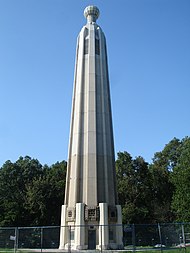Nixon, New Jersey | |
|---|---|
| Coordinates: 40°30′51″N74°22′03″W / 40.51417°N 74.36750°W | |
| Country | |
| State | |
| County | Middlesex |
| Township | Edison |
| Elevation | 52 ft (16 m) |
| GNIS feature ID | 878807 [1] |
Nixon is an unincorporated community located within Edison Township in Middlesex County, in the U.S. state of New Jersey. [2] [3] It was named after Lewis Nixon, a manufacturer and community leader. Soon after the outbreak of World War I, Nixon established a massive volatile chemicals processing facility there, known as the Nixon Nitration Works. It was the site of the 1924 Nixon Nitration Works disaster, a massive explosion and resulting fire that killed 20 people and destroyed several square miles around the plant. [4]




